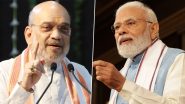New Delhi, Aug 22 (PTI) A court here has acquitted two men of the charge of killing their friend in 2019, saying there were "serious doubts" on the allegations against them.
The court, which rejected the prosecution's case as it was not corroborated by forensic reports, evidence about the motive and the theory of last seen together, observed that in a murder case, it is the judiciary's duty to scrutinise the evidence with "extraordinary care" as a convicted person could be awarded the "highest penalty".
Also Read | Ramanjit Singh Extradition: 2016 Nabha Jailbreak Mastermind Romy Extradited From Hong Kong (See Pic).
Additional Sessions Judge Sushil Anuj Tyagi was hearing a case against Ankit and Gautam, who were accused of stabbing their friend Gaurav to death in October 2019 and then dumping the body on a railway track within the Sarai Rohilla police station limits.
"In the present case, the allegations against the accused persons are that they took the deceased from his house and murdered him by stabbing knives. There is no eyewitness to the alleged crime and the case is totally based upon circumstantial evidence," the court said in a recent order.
It said the forensic reports had "exonerated" the first accused, Ankit, as the bloodstains on the knife and clothes allegedly recovered from him did not match the deceased's DNA profile.
In its 58-page verdict, the court said according to the prosecution, the second accused, Gautam, and two juveniles produced blood-stained knives, used as the weapons of offence, at the time of their surrender before police.
It noted that the knives and the clothes found at their instance matched with the DNA profiling of the deceased.
But there were "serious doubts" upon the recovery of the knife and clothes from Gautam because of several "contradictions and inconsistencies" in the testimony of a prime police witness, who had accompanied the investigating officer (IO), the court said.
It said while the prosecution alleged that three knives were produced by Gautam and two juveniles at the time of their surrender, another key police witness deposed about only one knife being produced and yet another official witness to the seizure testified that he did not remember whether knives were produced at all.
"It is also important to note here that there is no independent public witness to the recovery and seizure of knives or clothes," the court said.
Regarding the last-seen-together theory, the court noted that according to the victim's sister, the deceased had gone with both the accused on October 9, 2019 but the IO recorded her statement after more than a month.
"It is not the case of the prosecution that the investigation unfolded or proceeded based on the statement of the sister of the deceased.... In fact, the accused Ankit was apprehended at the instance of secret information.... The statements were recorded on November 11, 2019, when almost all the investigation was completed," the court said.
It said there was a time gap of more than 12 hours between the theory of last seen together (11 am on October 9) and the approximate time of death (12 am in the intervening night of October 9-10) and there was no evidence of the accused persons and the deceased being together in those 12 hours.
"There is no technical evidence, such as call detail record (CDR) or mobile phone locations of the deceased or accused persons or any CCTV footage of the nearby area. As such, given the time gap between the last seen together and the time of death of the deceased, the reliability of the last-seen evidence cannot be overemphasised," the court said.
Regarding the motive, it said the prosecution was unable to prove that the accused had any motive for the offence.
"In a murder case, it is the duty of the court to scrutinise the evidence with extraordinary care as the person convicted runs the risk of being subjected to the highest penalty prescribed by the Indian Penal Code," the judge said.
"Taking a holistic view of the evidence on record, this court is of the view that there are serious doubts about the commission of the offence by the accused persons and it is settled that the benefit of any doubt must go to the accused persons...," he added while acquitting the duo.
(This is an unedited and auto-generated story from Syndicated News feed, LatestLY Staff may not have modified or edited the content body)













 Quickly
Quickly















